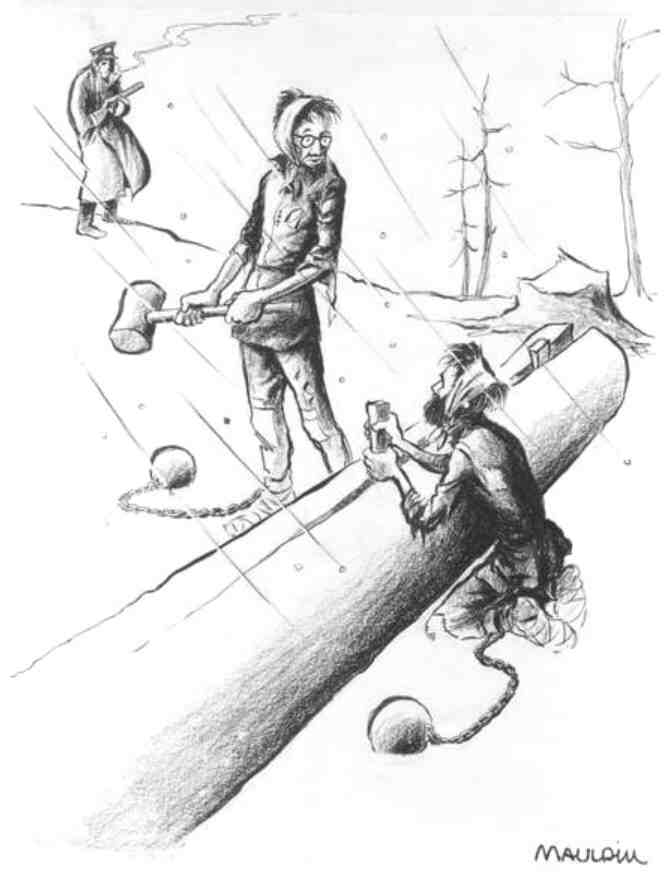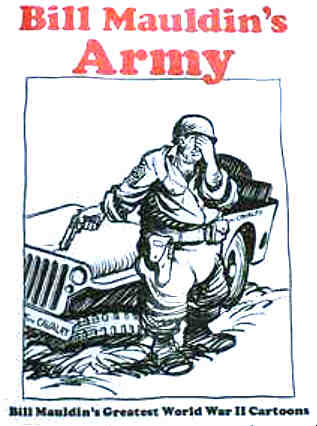I
Won the Nobel Prize for Literature. What was your crime?
by Bill Mauldin, 1958

Bill Mauldin, the Army sergeant who created Willie
and Joe, the cartoon characters who became enduring symbols of the grimy, irrepressible
US infantrymen who triumphed over the German army and prevailed over their own
rear-echelon officers in World War II, died on 22 January 2003 in Newport Beach,
California. He was 81. The cause was pneumonia. Mauldin had been suffering from
Alzheimer's disease.
After Willie and Joe won the war, Mauldin became
a syndicated newspaper cartoonist and went on for more than 50 years to caricature
bigots, superpatriots, doctrinaire liberals and conservatives, and pompous souls
in whatever form they appeared. He won the Pulitzer Prize twice, once in 1944
for his World War II work, again in 1959 for his commentary on Soviet treatment
of Boris Pasternak [above]. Mauldin gave up regular cartooning assignments
in the early 1990's, complaining that arthritis made drawing too difficult.
He frequently lamented that editorial cartoonists
were too soft and that more of them needed to be "stirrer-uppers." Mauldin worked
full time at being a stirrer-upper, and while he was on duty nobody was safe
from his editorial brush. During the war, he excoriated self-important generals,
grassy green "90-day wonders," insensitive drill sergeants, palate-dulled mess
sergeants, glamor-dripping Air Force pilots in leather jackets, and café
owners in liberated countries who rewarded the thirsty G.I.'s who had freed
them by charging them double for brandy. He was nothing short of beloved by
his fellow enlisted men.
But no Mauldin characters were more memorable
than Willie and Joe, the unshaven, listless, dull-eyed, cynical dogfaces who
spent the war fighting the Germans, trying to keep dry and warm and flirting
with insubordination. They were the stars of Up Front Mauldin's wartime
best seller, and their exploits were reported regularly in various service publications,
including Stars and Stripes and the 45th Division News. Their
likenesses were found in pup tents and bivouacs from Brittany to Berlin, tacked
up next to the inevitable glossies of those other G.I. favorites, Betty Grable
and Dorothy Lamour. Mauldin began his sojourn with the 45th, which arrived in
North Africa and fought into Italy, but he sampled many divisions and places
as his fame grew.
Willie and Joe were the guys who always got sentry
duty when it rained or snowed and shrapnel in their backsides whenever they
left their foxholes. It was they who contended with lice and fleas, complained
constantly about the K rations they were supposed to eat, slept in rat-infested
barns, never seemed to find the soap when they had the rare opportunity to bathe,
and suffered the incessant, grinding, morale-destroying boredom that only the
infantry soldier knows.
The only thing that could never be questioned
about Willie and Joe was their determination to survive and win. Gen. Dwight
D. Eisenhower, the supreme Allied commander, looked forward to their adventures,
and Gen. Mark Clark so appreciated them that he saw to it that Mauldin got a
specially equipped Jeep in Italy so that he could go where he wanted and draw
what he wished. Ernie Pyle, one of the G.I.'s favorite correspondents, termed
Mauldin the best cartoonist of the war because he drew pictures of the men who
were "doing the dying," even though nobody could ever kill Willie and Joe.
Gen. George S. Patton was one of a small minority
who had no use for them. He liked his heroes cleanshaven and obedient, and he
was uneasy that the men who served under him revered the likes of such unorthodoxy.
Asked toward the end of the war to comment on Sergeant Mauldin's cartoons, General
Patton replied, "I've seen only two of them, and I thought they were lousy."
Mauldin's representations have endured in unforgettable
images and words:
"Just gimme a coupla aspirin. I already got a Purple Heart," says a weary
Joe to a corpsman seated at a table containing medicine and medals.
"He's right Joe," says Willie after a superior admonishes them for the slovenly
way they look. "When we ain't fightin' we should ack like sojers."
"Must be a tough objective," says Willie to Joe as they huddle on the side
of a road, weapons ready. "Th' old man says we're gonna have th' honor of liberatin'
it."
Joe was created first by Mauldin, well before
Pearl Harbor. Joe was never an angel, but at least he was a cleanshaven, well-scrubbed
young man, and he appeared in various Army publications, especially the 45th
Division News. After 07 December 1941, he met Willie, and the two went through
the Italian campaign together, becoming disreputable in their personal habits.
During training Joe was a Choctaw Indian with
a hooked nose, and Willie was his rednecked straight man, As they matured overseas
during the stresses of shot, shell and K rations, and grew whiskers because
shaving water was scarce in mountain foxholes, for some reason Joe seemed to
become more of a Willie and Willie more of a Joe.
Willie and Joe and their creator made the cover
of Time magazine in 1945 — the year after Mauldin won his first Pulitzer
— and he came home from the war a celebrity. He had made a lot of money but
wasn't very happy. "I never quite could shake off the guilt feeling that I had
made something good out of the war," he said.
After the war, Mauldin seemed lost for a time.
He covered the Korean War briefly for Collier's but was not entirely
pleased with his work. He resuscitated Joe, made him a war correspondent and
had him writing letters to the stateside Willie. In 1958 he visited Dan Fitzpatrick,
editorial cartoonist for The St. Louis Post-Dispatch, who disclosed
that he was planning to retire. Mauldin applied for the job, got it and won
a second Pulitzer Prize in 1959 for a cartoon on the plight of the Russian author
Boris Pasternak. The cartoon showed two prisoners in Siberia,
one of whom said to the other: “I won the Nobel Prize for Literature.
What was your crime?”
Mauldin remained with The Post-Dispatch
until 1962, when he joined The Chicago Sun-Times. He seemed to regain
his old form and was regarded as one of the most influential cartoonists of
his day.
Besides segregationists, redbaiters and dictators,
Mauldin used his pen to strike at the Ku Klux Klan and veterans' organizations
that he thought were too far to the right. He later said he thought he had gone
too far in his denunciations and "became a bore." Many newspapers agreed and
began to drop his syndicated cartoons.
He became an advocate for veterans and joined
the American Veterans Committee, which saw itself as an alternative to more
traditional organizations like the American Legion and the Veterans of Foreign
Wars. He served two terms as its president in the 1950's.
Mauldin did not confine his activities to drawing.
His postwar book Back Home was as much a job of writing as it was drawing,
and it received good reviews on both counts. He also appeared in two movies,
both made in 1951. One was John Huston's Red Badge of Courage, with
Audie Murphy, the most decorated hero of the war. Mauldin received good reviews,
but the movie failed at the box office. The other was Teresa, directed
by Fred Zinnemann.
 In the middle 1950's he moved to Rockland County in New York, and in 1956 he
ran unsuccessfully for Congress against the incumbent in the 28th District,
a conservative Republican named Katharine St. George. Mauldin, a Democrat, thought
of himself as the left-of-center candidate.
In the middle 1950's he moved to Rockland County in New York, and in 1956 he
ran unsuccessfully for Congress against the incumbent in the 28th District,
a conservative Republican named Katharine St. George. Mauldin, a Democrat, thought
of himself as the left-of-center candidate.
Among Mauldin's other books are A Sort of
a Saga (1949) — Bill Mauldin's Army (1951) — Bill
Mauldin in Korea (1953) — What's Got Your Back Up (1961)
— I've Decided I Want My Seat Back (1965) — The Brass
Ring (1972). He also illustrated many articles for Life, The Saturday
Evening Post, Sports Illustrated and other publications.
William Henry Mauldin was born on 29 October 1921,
in Mountain Park NM, one of two sons born to Sidney Albert Mauldin, a handyman,
and Edith Katrina Bemis Mauldin. As a child, he suffered from rickets, a disease
caused by a deficiency of vitamin D, and was unable to engage in strenuous activity.
His head seemed too big for his spindly body. When he was 8 he heard one of
his father's friends say, "If that was my son, I'd drown him."
Mauldin never forgot the insult and turned all
his energy to teaching himself how to draw. His family moved to Phoenix, and
while he was still in high school there he enrolled in a correspondence cartoon
school. He left high school without getting a diploma, moved to Chicago and
continued his studies at the Chicago Academy of Fine Arts. His maternal grandmother
gave him the $300 tuition fee.
He moved back to Phoenix and began to sell his
drawings. Some of the first were published by Arizona Highways magazine.
In 1940 Mauldin also created cartoons for both sides in the Texas gubernatorial
campaign. He later said he joined the Arizona National Guard to avoid the Texas
politicians, who discovered he was working both sides of the fence. The Guard
required no physical examination — Mauldin doubted he could ever pass one —
and he was accepted. When the Arizona Guard was federalized in 1940, Mauldin
found himself in the Army.
He scored more than 140 on his Army I.Q. test
and later said that once the Army became aware of this, it did with him what
it tended to do with all bright people who become enlisted men: it gave him
K.P. for four months. He managed to get a transfer to Oklahoma's 45th Division
so that he could draw cartoons for the 45th Division News, first as a volunteer,
later as a member of the staff.
Mauldin married Norma Jean Humphries in 1942.
They were divorced in 1946. The following year he married Natalie Sarah Evans,
who died in a car accident. In 1972 he married Christine Lund. His survivors
also include his seven sons; a daughter died in 2001.
Mauldin had two war experiences after Korea.
One came in 1965 when he visited his son, Bruce, a serviceman stationed in Vietnam.
Mauldin wrote about an attack on Pleiku. He also visited troops in Saudi Arabia
during the Persian Gulf war in 1991, toward the end of his career. He did not
approve of the war, and his cartoons were especially hard on President George
Bush. He made no further use of Willie and Joe.
In 2002 Mauldin's health and memory declined
in a nursing home in Orange County, California.

 In the middle 1950's he moved to Rockland County in New York, and in 1956 he
ran unsuccessfully for Congress against the incumbent in the 28th District,
a conservative Republican named Katharine St. George. Mauldin, a Democrat, thought
of himself as the left-of-center candidate.
In the middle 1950's he moved to Rockland County in New York, and in 1956 he
ran unsuccessfully for Congress against the incumbent in the 28th District,
a conservative Republican named Katharine St. George. Mauldin, a Democrat, thought
of himself as the left-of-center candidate.